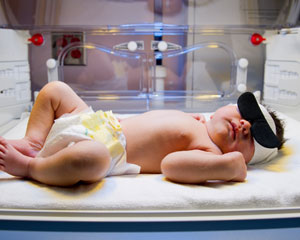What is jaundice?
Jaundice is a yellow discoloration of a newborn's skin and eyes. This condition usually goes away without treatment. However, jaundice can cause brain damage if severe and untreated.
Who gets jaundice?
- Half of all newborns will have normal jaundice beginning one day or more after birth
- Jaundice that appears within the first 24 hours of life, or after the first week, is not considered normal
What causes jaundice?
- Abnormal jaundice may be caused by the baby's blood type (ABO or Rh factor incompatibility), or one of many other causes
- A baby's liver is not able to filter old blood cells quickly when new blood cells are made
- The build-up of old blood cells make a yellow substance called bilirubin
- A baby's bowel movements help to pass the bilirubin. When baby's bowel movements and liver function are slow, the bilirubin collects and causes the yellow skin color.
How is jaundice measured?
- The yellow color is first seen in the eyes and head before it moves down the baby's body
- A blood test is done on all newborns at 36 hours of age or discharge, whichever comes first, to identify newborns who may be at risk for developing moderate to severe jaundice
- The result of that blood test is plotted on a chart for the pediatrician to review and determine the baby's risk — if the baby needs treatment or can be discharged to go home

What is the treatment?
- Feeding every one to three hours with breast milk or formula (not water) is important so that bowel movements can pass the bilirubin
- Feed at least every two to three hours
- Water or other liquids do not help. Only breast milk or formula helps pass bilirubin.
- Phototherapy (light) with a special lamp or lighted blanket may be used in the hospital or at home
- Light energy breaks down bilirubin through the skin
- The baby needs to stay in light therapy at all times except during feeding
- Make sure baby has at least two to 10 bowel movements and four to five wet diapers a day
- Blood samples will be taken during treatment to make sure the bilirubin is decreasing
- Severe, abnormal jaundice may require a blood transfusion
What about breastfeeding with jaundice?
- Breastfeeding does not cause jaundice
- Frequent feeding can help prevent severe jaundice
- Any baby (breast or bottle-fed) who doesn't take enough milk will not have enough bowel movements to pass the bilirubin
- A breastfed baby needs to nurse every one to three hours (at least eight to 12 times a day)
- Extra feeding(s) with formula or pumped breast milk may be needed if your baby isn't:
- Taking enough milk from the breast
- Having at least two to 10 bowel movements a day
- Taking the breast. The mother will need to use a breast pump
- Do not use a pacifier when your baby seems eager to suck; nurse more often to make more milk
Key points
- Jaundice is:
- Very common
- Temporary
- Treatable
- Frequent feeding with breast milk or formula is very important
- Feeding with water (or any liquid other than breast milk or formula) doesn't help